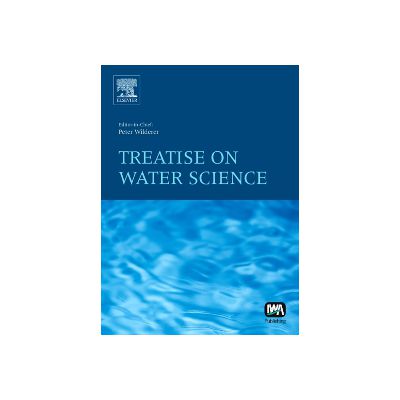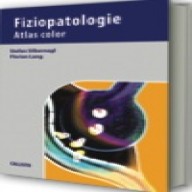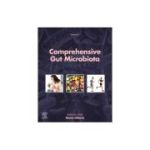Treatise on Water Science, Four-Volume Set

Preț: 8400,00 lei
Disponibilitate: în stoc la furnizor
Autor: P Wilderer
ISBN: 9780444531933
Editura: Academic Press
Anul publicarii: 2011
Pagini: 2102
Categoria: FOOD SCIENCE & NUTRITION
DESCRIERE
*Published in partnership with and endorsed by the International Water Association (IWA), demonstrating the authority of the content.
*Editor-in-Chief Peter Wilderer, a Stockholm Water Prize recipient, has assembled a world-class team of volume editors and contributing authors
*Topics related to water resource management, water quality and supply, and handling of wastewater are treated in depth
Description
Water quality and management are of great significance globally, as the demand for clean, potable water far exceeds the availability. Water science research brings together the natural and applied sciences, engineering, chemistry, law and policy, and economics, and the Treatise on Water Science seeks to unite these areas through contributions from a global team of author-experts. The 4-volume set examines topics in depth, with an emphasis on innovative research and technologies for those working in applied areas.
Treatise on Water Science, Four-Volume Set, 1st Edition
Volume 1: Management of Water Resources,
Edited by Peter Rogers, Harvard School for Engineering and Applied Sciences, Cambridge, MA, USA
Volume 1 focuses on the Management of Water Resources. Without water, life as we know it would disappear from the planet. Water plays an extremely important role in maintaining a sustainable life on this planet for all species including homo sapiens.
The volume posits three questions:
Will we have enough water to grow food to feed ourselves in the 21st century?
How will we provide water and sanitation for an additional 3 billion urban dwellers?
How should we address the future climate uncertainties?
The eleven chapters in this volume deal with how we can examine these questions from the different perspectives of a group of leading water experts drawn from the fields of engineering, economics, public health, government, finance, and agriculture. The chapters are intended primarily for physical and biological scientists to understand the economic and social context of their own work.
Integrated Water Resources Management
Governing Water: Institutions, Property Rights, and Sustainability
Managing Aquatic Ecosystems
Water as an Economic Good: Old and New Concepts and Implications for
Analysis and Implementation
Providing Clean Water: Evidence from Randomized Evaluations
Pricing Water and Sanitation Services
Groundwater Management
Managing Agricultural Water
Implementation of Ambiguous Water-Quality Policies
Predicting Future Demands for Water
Risk Assessment, Risk Management, and Communication: Methods for
Climate Variability and Change
Volume 2: The Science of Hydrology
Edited by Stefan Uhlenbrook, Department of Water Engineering, UNESCO-IHE, Delft, The Netherlands
Volume 2, Hydrology covers the water cycle, and all processes involved at different scales. It discusses dynamics of all water cycle variables (precipitation, evaporation and runoff) and the natural and human water storages such as interception, soil water, groundwater, lakes and reservoirs. It analyzes the movement, distribution and spatio-temporal dynamics of hydrological processes and various ways to observe and quantify them (including remote sensing and ground-based techniques). Chapters include coverage of coupled processes and other linkages of hydrology and related fields such as aquatic ecology, biogeochemistry and geomorphology. Three chapters discuss different ways to model hydrological systems and the uncertainty of hydrological predictions.
Global Hydrology
Precipitation
Evaporation in the Global Hydrological Cycle
Interception
Infiltration and Unsaturated Zone
Mechanics of Groundwater Flow
The Hydrodynamics and Morphodynamics of Rivers
Lakes and Reservoirs
Tracer Hydrology
Hydrology and Ecology of River Systems
Hydrology and Biogeochemistry Linkages
Catchment Erosion, Sediment Delivery, and Sediment Quality
Field-Based Observation of Hydrological Processes
Observation of Hydrological Processes Using Remote Sensing
Hydrogeophysics
Hydrological Modeling
Uncertainty of Hydrological Predictions
Statistical Hydrology
Scaling and Regionalization in Hydrology
Stream? Groundwater Interactions
Volume 3: Aquatic Chemistry and Biology
Fritz Frimmel, Karlsruhe Institute of Technology, Karlsruhe, Germany
Volume 3, Aquatic Chemistry and Microbiology, deals with reactions, effects and fate of water ingredients in aquatic systems, and with the tools for reliable assessment of water quality concerning chemical, hygienic and toxicological aspects. It is intended to supply the molecular facts for a meaningful diagnosis of the status of aquatic systems, for efficient technical processes within the water cycle, for drinking water supply and for waste water management. The information given in the volume is of special interest for analytical chemists, environmental scientists and engineers working in research, development or university teaching. ?
Sum Parameters: Potential and Limitations
Trace Metal(loid)s (As, Cd, Cu, Hg, Pb, PGE, Sb, and Zn) and Their Species
Sources, Risks, and Mitigation of Radioactivity in Water
Emerging Contaminants
Natural Colloids and Manufactured Nanoparticles in Aquatic and
Terrestrial Systems
Sampling and Conservation
Measurement Quality in Water Analysis
Identification of Microorganisms Using the Ribosomal RNA Approach and
Fluorescence In Situ Hybridization
Bioassays for Estrogenic and Androgenic Effects of Water Constituents
Online Monitoring Sensors
Standardized Methods for Water-Quality Assessment
Waterborne Parasitic Diseases: Hydrology, Regional Development, and Control
Bioremediation: Plasmid-Mediated Bioaugmentation of Microbial
Communities ? Experience from Laboratory-Scale Bioreactors
Characterization Tools for Differentiating Natural Organic Matter from Effluent
Organic Matter
Chemical Basis for Water Technology
Volume 4: Water-Quality Engineering
Edited by Keisuke Hanaki, The University of Tokyo, Tokyo, Japan; and Tom Vereijken, European Water Partnership, Grontmij, The Netherlands
Volume 4, Water Quality Engineering, includes theory, practice and the recent development of a wide range of technologies for water, wastewater and sludge. Chapters in the volume explore how local social, economic and engineering factors must be considered when making technology choices.
Water and Wastewater Management Technologies in the Ancient Greek and
Roman Civilizations
Membrane Filtration in Water and Wastewater Treatment
Wastewater Reclamation and Reuse System
Seawater Use and Desalination Technology
Abstraction of Atmospheric Humidity
Safe Sanitation in Low Economic Development Areas
Source Separation and Decentralization
Modeling of Biological Systems
Urban Nonpoint Source Pollution Focusing on Micropollutants and Pathogens
Constructed Wetlands and Waste Stabilization Ponds
Membrane Technology for Water: Microfiltration, Ultrafiltration, Nanofiltration,
and Reverse Osmosis
Wastewater as a Source of Energy, Nutrients, and Service Water
Advanced Oxidation Processes
Biological Nutrient Removal
Biofilms in Water and Wastewater Treatment
Membrane Biological Reactors
Anaerobic Processes
Microbial Fuel Cells
Water in the Pulp and Paper Industry
Water in the Textile Industry
Water Availability and Its Use in Agriculture
*Editor-in-Chief Peter Wilderer, a Stockholm Water Prize recipient, has assembled a world-class team of volume editors and contributing authors
*Topics related to water resource management, water quality and supply, and handling of wastewater are treated in depth
Description
Water quality and management are of great significance globally, as the demand for clean, potable water far exceeds the availability. Water science research brings together the natural and applied sciences, engineering, chemistry, law and policy, and economics, and the Treatise on Water Science seeks to unite these areas through contributions from a global team of author-experts. The 4-volume set examines topics in depth, with an emphasis on innovative research and technologies for those working in applied areas.
Treatise on Water Science, Four-Volume Set, 1st Edition
Volume 1: Management of Water Resources,
Edited by Peter Rogers, Harvard School for Engineering and Applied Sciences, Cambridge, MA, USA
Volume 1 focuses on the Management of Water Resources. Without water, life as we know it would disappear from the planet. Water plays an extremely important role in maintaining a sustainable life on this planet for all species including homo sapiens.
The volume posits three questions:
Will we have enough water to grow food to feed ourselves in the 21st century?
How will we provide water and sanitation for an additional 3 billion urban dwellers?
How should we address the future climate uncertainties?
The eleven chapters in this volume deal with how we can examine these questions from the different perspectives of a group of leading water experts drawn from the fields of engineering, economics, public health, government, finance, and agriculture. The chapters are intended primarily for physical and biological scientists to understand the economic and social context of their own work.
Integrated Water Resources Management
Governing Water: Institutions, Property Rights, and Sustainability
Managing Aquatic Ecosystems
Water as an Economic Good: Old and New Concepts and Implications for
Analysis and Implementation
Providing Clean Water: Evidence from Randomized Evaluations
Pricing Water and Sanitation Services
Groundwater Management
Managing Agricultural Water
Implementation of Ambiguous Water-Quality Policies
Predicting Future Demands for Water
Risk Assessment, Risk Management, and Communication: Methods for
Climate Variability and Change
Volume 2: The Science of Hydrology
Edited by Stefan Uhlenbrook, Department of Water Engineering, UNESCO-IHE, Delft, The Netherlands
Volume 2, Hydrology covers the water cycle, and all processes involved at different scales. It discusses dynamics of all water cycle variables (precipitation, evaporation and runoff) and the natural and human water storages such as interception, soil water, groundwater, lakes and reservoirs. It analyzes the movement, distribution and spatio-temporal dynamics of hydrological processes and various ways to observe and quantify them (including remote sensing and ground-based techniques). Chapters include coverage of coupled processes and other linkages of hydrology and related fields such as aquatic ecology, biogeochemistry and geomorphology. Three chapters discuss different ways to model hydrological systems and the uncertainty of hydrological predictions.
Global Hydrology
Precipitation
Evaporation in the Global Hydrological Cycle
Interception
Infiltration and Unsaturated Zone
Mechanics of Groundwater Flow
The Hydrodynamics and Morphodynamics of Rivers
Lakes and Reservoirs
Tracer Hydrology
Hydrology and Ecology of River Systems
Hydrology and Biogeochemistry Linkages
Catchment Erosion, Sediment Delivery, and Sediment Quality
Field-Based Observation of Hydrological Processes
Observation of Hydrological Processes Using Remote Sensing
Hydrogeophysics
Hydrological Modeling
Uncertainty of Hydrological Predictions
Statistical Hydrology
Scaling and Regionalization in Hydrology
Stream? Groundwater Interactions
Volume 3: Aquatic Chemistry and Biology
Fritz Frimmel, Karlsruhe Institute of Technology, Karlsruhe, Germany
Volume 3, Aquatic Chemistry and Microbiology, deals with reactions, effects and fate of water ingredients in aquatic systems, and with the tools for reliable assessment of water quality concerning chemical, hygienic and toxicological aspects. It is intended to supply the molecular facts for a meaningful diagnosis of the status of aquatic systems, for efficient technical processes within the water cycle, for drinking water supply and for waste water management. The information given in the volume is of special interest for analytical chemists, environmental scientists and engineers working in research, development or university teaching. ?
Sum Parameters: Potential and Limitations
Trace Metal(loid)s (As, Cd, Cu, Hg, Pb, PGE, Sb, and Zn) and Their Species
Sources, Risks, and Mitigation of Radioactivity in Water
Emerging Contaminants
Natural Colloids and Manufactured Nanoparticles in Aquatic and
Terrestrial Systems
Sampling and Conservation
Measurement Quality in Water Analysis
Identification of Microorganisms Using the Ribosomal RNA Approach and
Fluorescence In Situ Hybridization
Bioassays for Estrogenic and Androgenic Effects of Water Constituents
Online Monitoring Sensors
Standardized Methods for Water-Quality Assessment
Waterborne Parasitic Diseases: Hydrology, Regional Development, and Control
Bioremediation: Plasmid-Mediated Bioaugmentation of Microbial
Communities ? Experience from Laboratory-Scale Bioreactors
Characterization Tools for Differentiating Natural Organic Matter from Effluent
Organic Matter
Chemical Basis for Water Technology
Volume 4: Water-Quality Engineering
Edited by Keisuke Hanaki, The University of Tokyo, Tokyo, Japan; and Tom Vereijken, European Water Partnership, Grontmij, The Netherlands
Volume 4, Water Quality Engineering, includes theory, practice and the recent development of a wide range of technologies for water, wastewater and sludge. Chapters in the volume explore how local social, economic and engineering factors must be considered when making technology choices.
Water and Wastewater Management Technologies in the Ancient Greek and
Roman Civilizations
Membrane Filtration in Water and Wastewater Treatment
Wastewater Reclamation and Reuse System
Seawater Use and Desalination Technology
Abstraction of Atmospheric Humidity
Safe Sanitation in Low Economic Development Areas
Source Separation and Decentralization
Modeling of Biological Systems
Urban Nonpoint Source Pollution Focusing on Micropollutants and Pathogens
Constructed Wetlands and Waste Stabilization Ponds
Membrane Technology for Water: Microfiltration, Ultrafiltration, Nanofiltration,
and Reverse Osmosis
Wastewater as a Source of Energy, Nutrients, and Service Water
Advanced Oxidation Processes
Biological Nutrient Removal
Biofilms in Water and Wastewater Treatment
Membrane Biological Reactors
Anaerobic Processes
Microbial Fuel Cells
Water in the Pulp and Paper Industry
Water in the Textile Industry
Water Availability and Its Use in Agriculture
Categorii de carte
-Comandă specială
-Edituri
-Promo
-Publicaţii Callisto
-Cărţi noi
-- 604,80 leiPRP: 672,00 lei
- 585,90 leiPRP: 651,00 lei
- 1323,00 leiPRP: 1470,00 lei
Promoţii
-- 652,05 leiPRP: 724,50 lei
- 7497,00 leiPRP: 8820,00 lei
- 604,80 leiPRP: 672,00 lei











REVIEW-URI